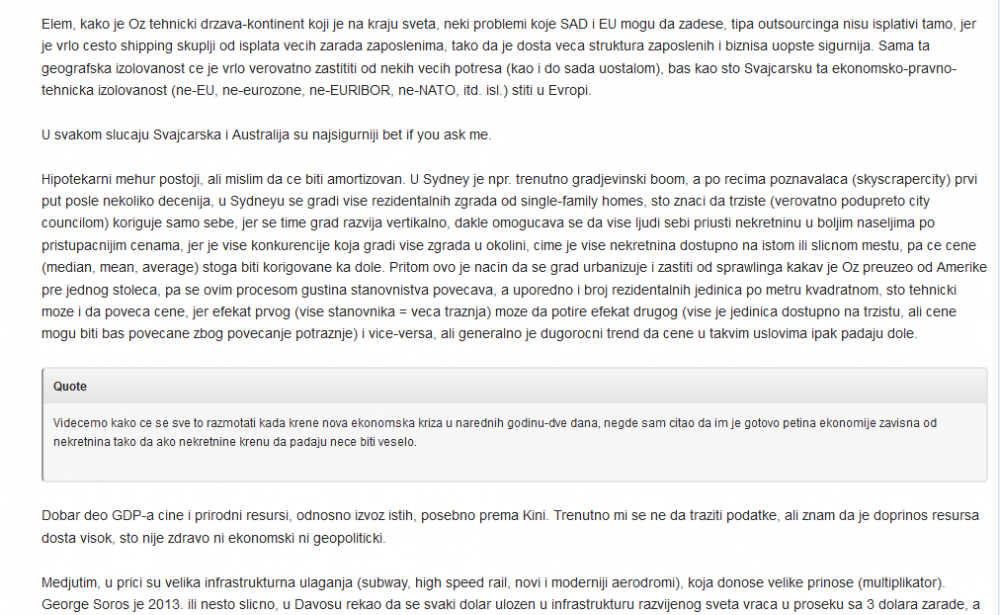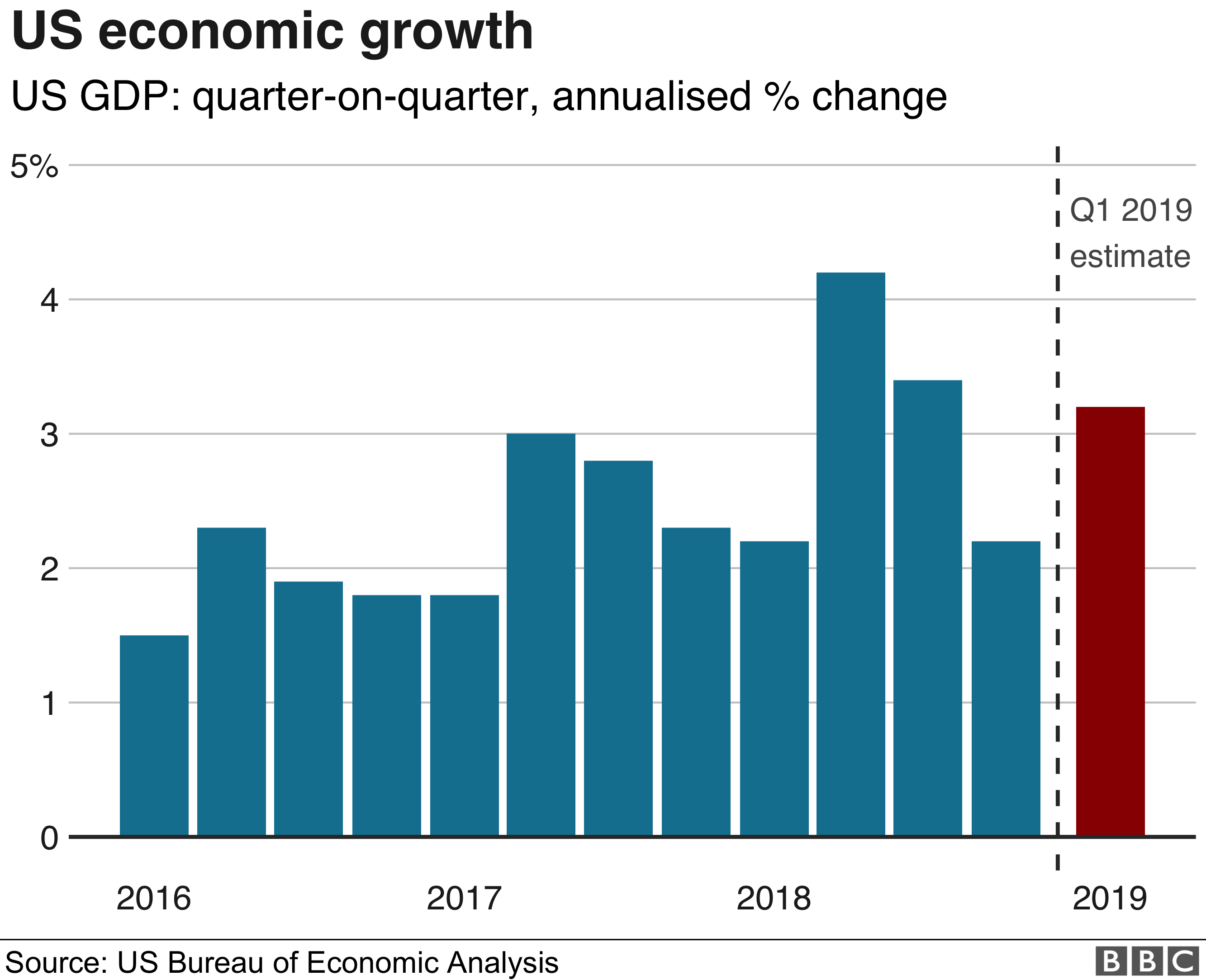-
Posts
361 -
Joined
-
Last visited
Posts posted by McCarthy
-
-
At least 71 injured in clashes
At least 71 people were injured in Tuesday's clashes and taken to a hospital in Caracas, according to Magia Santi, president of Salud Chacao Medical Center.
Of those 71 people taken to the hospital:
- 43 were injured by rubber bullets
- Two were treated for gunshot wounds
- 21 were treated for traumatic injuries
- Three suffered respiratory injuries
- One fainted
- One suffered a hand injury
-
^ A sad verovatno ima bolje procene.
QuotePompeo: Maduro's airplane was ready to leave this morning — then Russia stopped him
Secretary of State Mike Pompeo, speaking to CNN’s Wolf Blitzer on “The Situation Room” just moments ago, claimed that Nicolás Maduro was preparing to leave Venezuela "this morning" but was talked out of it by the Russians.
“We’ve watched throughout the day, it’s been a long time since anyone’s seen Maduro,” Pompeo said. “He had an airplane on the tarmac, he was ready to leave this morning as we understand it and the Russians indicated he should stay.”
Pompeo later added, "He was headed for Havana."
-
1 hour ago, Doc Holiday said:
vidim na blogu da je tako pisalo... I ukinuli CNN...
I BBC je blokiran.
Rezim je poceo da gazi sopstvene gradjane tenkovima po ulici:
-
Norway finds 'Russian spy whale' off Arctic coast
-
Quote
A kako je Trump stetocina? Ne radi ono sto ti zelis da radi? Njemu raste popularnost, pa ti vidi jel stetocina ili nije.
Psi laju, karavani prolaze.
Uzima 2020. laganica.
-
 2
2
-
-
Quote
Да похвалим Макартија за допинос, али ова прича о сигурним економијама УС, Швица и Аус ме је мало насмејала. Да оставим УС за неки други пут, али политика СНБ са слабљењем ЦХФ , огромним напуцавањем баланс шита ( у $ деноминованим хартијама) и каматним стопама је прилично ризична из више разлога.
Везано за Озијевце, ту такође има више ствари, само да напоменем огромну зависност од извоза у Кину, те самим тим снажну полугу коју Кина има, а и већ користи везано за сировине. Друга ствар је наравно тржиште некретнина. Препоручујем обавезно праћење алтернативних аналитичара, попут Steeve Keena кога јако дуго пратим, а и зарадио сам доста на некима од његових прогноза.
Ne postoji potpuna sigurnost u bilo cemu, to je nonsense per se. Postoje sigurniji i manje sigurniji betovi u dugom roku.
Pisao sam o CH/AUS na f92 pre nekoliko meseci, mrzi me da kucam de nuevo, pa prenosim dole u attachmentu.
https://forum.b92.net/topic/76080-makroekonomija-novosti-projekcije-diskusija/#entry6159818
-
Quote
Trump and Democrats Agree to Pursue $2 Trillion Infrastructure Plan
April 30, 2019
WASHINGTON — Democratic congressional leaders emerged from a meeting at the White House on Tuesday and announced that President Trump had agreed to pursue a $2 trillion infrastructure plan to upgrade the nation’s highways, railroads, bridges and broadband.
Senator Chuck Schumer, the minority leader, said that there had been “good will” in the meeting and that it was “different from some of the other meetings that we’ve had.” Speaking alongside Speaker Nancy Pelosi, he said the group planned to meet again in three weeks, when Mr. Trump was expected to tell them how he planned to actually pay for the ambitious project.
The first substantive sit-down between Mr. Trump and Democratic leadership since the 35-day government shutdown last winter unfolded at a tense moment.
Since their last face-to-face meeting at the White House, the special counsel released his 448-page report detailing Mr. Trump’s monthslong effort to thwart an investigation that loomed over his presidency. Ms. Pelosi, since then, has tried to caution her colleagues against impeaching the president, while facing growing pressure from her caucus and from 2020 Democratic presidential contenders to do so.
Mr. Trump is also going to great lengths to stonewall expanding investigations by House Democrats, resisting efforts to obtain his tax returns, preventing former aides from testifying and even pursuing legal action against Deutsche Bank, a longtime lender to the Trump Organization, and another bank to stop them from responding to congressional subpoenas.
But speaking to reporters on the driveway outside of the West Wing, Mr. Schumer told reporters there was no issue with pursuing both oversight and legislation along parallel tracks.
“In previous meetings, the president has said if these investigations continue, I can’t work with you,” Mr. Schumer said of the president.
“He didn’t bring it up. I believe we can do both at once,” Mr. Schumer added. “The two are not mutually exclusive, and we were glad he didn’t make it that way.”
“Infrastructure Week” has become a recurring trope of the Trump presidency. A $1 trillion infrastructure plan remains one of Mr. Trump’s unfulfilled promises from his 2016 campaign. The effort took a back seat to the administration’s failed attempt to repeal the Affordable Care Act and then to its successful passage of a tax overhaul in 2017.
Editors’ Picks
The original plan was also one that everyone rejected from the beginning — Mr. Trump even criticized public-private partnerships, which were key to the plan’s financing — and no new plan has been put forward since.
But Democrats went to the White House for a meeting, intent to play along as if there was a chance.
Ms. Pelosi requested the meeting with Mr. Trump in April, in part to change the conversation from impeachment to infrastructure and to demonstrate that Democrats want to proceed with a policy agenda, and not merely with oversight investigations of the president.
For Mr. Trump, an infrastructure deal would provide him with a bipartisan achievement he could point to while campaigning.
Democrats arrived on Tuesday with a dozen-member delegation of lawmakers. Mr. Trump was accompanied in the meeting by Elaine Chao, the transportation secretary, as well as seven White House aides, including his daughter Ivanka Trump, who is also a presidential adviser; Larry Kudlow, the director of the National Economic Council; and Pat Cipollone, the White House counsel.
The only members of Mr. Trump’s team to speak were Mr. Kudlow and Ms. Chao, according to a source familiar with the meeting.
Democrats have become prepared for surprises during meetings with Mr. Trump. In the past, he has conducted supposedly closed-door sessions on live television, or shuttled his guests to the Situation Room for maximum privacy.
They, in turn, have surprised him by quickly reporting out the top lines of their meetings, speaking to reporters on the driveway in front of the White House. In September 2017, for instance, after Mr. Schumer and Ms. Pelosi joined the president for in-house Chinese food, they announced that Mr. Trump had agreed to work on an immigration deal, including protections for thousands of young immigrants from deportation. Mr. Trump was later forced to backtrack from that position.
A spotlight on the people reshaping our politics. A conversation with voters across the country. And a guiding hand through the endless news cycle, telling you what you really need to know.
On Tuesday, the 90-minute meeting took place behind closed doors and stayed broadly on topic. There was no discussion of hauling in the television cameras, according to a congressional aide.
While Mr. Trump has abruptly walked out on congressional leaders before, the mood on Tuesday stayed friendly. Extending a peace offering of sorts, Mr. Trump at one point offered Ms. Pelosi a white Tic Tac, which she accepted, according to a Democratic aide. At one point, the president noted that he liked the $2 trillion figure because it sounded better than $1.9 trillion.
But congressional leaders’ tactic of trying to stage-manage Oval Office meetings with Mr. Trump — and even hiking over to the White House for the meeting in the first place — struck some Democrats as out of step.
“We’re in the middle of a constitutional crisis here,” said Brian Fallon, a former aide to Mr. Schumer. “The most important job the Democrats have right now is to uphold the rule of law against a president who thinks the law doesn’t apply to him. We have bigger fish to fry than trying to look like we gave it a shot on infrastructure. This was the play in 2016. It strikes me as a very pre-Trump approach for how to manage.”
Speaking at the Milken Institute Global Conference in Los Angeles on Tuesday, Mick Mulvaney, the acting White House chief of staff, also expressed deep skepticism about the possibility of an infrastructure deal with Democrats. He said the two parties had major differences on the scope and timing of a plan, and he questioned Democrats’ intentions.
Mr. Mulvaney said he had advised the president that Republicans must push for environmental deregulation so new projects could get built within two years. He suggested that under current regulations, a trillion dollars’ worth of spending might not lead to new roads or bridges being built for 10 years.
“I want to change the environmental laws, how do you feel about that as a Democrat?” Mr. Mulvaney said. “It’s going to be a very difficult place for them to go. I think that may be the place where the discussions break down.”
Indeed, Mr. Schumer and Ms. Pelosi made it clear before the meeting that a deal must include funding to curb rising planet-warming emissions and protect against its effects.
Mr. Mulvaney was speaking the morning after experiencing a painful kidney stone. “It was a fun night, but it’s better than going to the meeting at the White House with Chuck and Nancy,” he joked.
For Democrats, the strategy appeared to put the onus on Mr. Trump to deliver a real plan and to lock him into the enthusiasm they said he showed privately.
“The key to the discussion, really, was the willingness of the president,” said Senator Thomas R. Carper of Delaware, the top Democrat on the Senate Environment and Public Works Committee. “By the end of the meeting, he said, ‘I have responsibility to lead on this front as well, and I’m prepared to do so.’ ”
During the meeting, Mr. Trump also brought up trade and health care legislation, particularly the push to pass his rewrite of the North American Free Trade Agreement through Congress.
Mr. Trump, who has recently vacillated on potentially introducing a Republican replacement for the Affordable Care Act, also raised the 2017 bipartisan deal proposed by Senator Patty Murray, Democrat of Washington, and Senator Lamar Alexander, Republican of Tennessee, that would fund critical subsidies to insurers.
“That was a good deal — we should revisit that,” Mr. Carper recalled the president saying of the deal.
https://www.nytimes.com/2019/04/30/us/politics/trump-infrastructure-plan.html -
Quote
EU is 'built on anti-fascism' not Christian values, says EU top job hopeful Violeta Tomic
The European Union was not built on Christian values but on anti-fascism, Slovenia’s Violeta Tomic, the European Left candidate for the bloc’s top job, told Euronews on Tuesday.
Tomic made the comments on Raw Questions as part of a series of live interviews Euronews is running in the build-up to next month’s European elections.
She rejected claims by some “mostly right-wingers” politicians — including rival spitzenkandidat Manfred Weber — that the bloc is built on Christian values because “in all small villages there is a Christian church.”
“I think it (the EU) is built on anti-fascism because after the Second World War we finally find out that it is peace that we want to keep inside of Europe,” she said.
Tomic also outlined how she would tackle some of the challenges facing the EU from climate should she replace Jean-Claude Juncker as European Commission President after May’s parliamentary elections.
-
Quote
Property prices: Sydney and Melbourne facing steepest declines in two decades
9Finance
Business News
By Matt Dunn
20 hours ago
Sydney’s property downturn will be the sharpest in more than two decades, with median house prices expected to dip below $1 million in the coming quarter.
This is the according to the Domain House Price Report for the March quarter, which revealed Sydney house prices have fallen 14.3 per cent from the mid-2017 peak.
The report also detailed Melbourne’s lowest quarterly moderation since June last year and stalling house prices in Brisbane following six years of continuous annual growth.
Perth and Canberra both saw house prices go down, with the nation’s capital suffering the steepest annual fall in a decade, while Adelaide and Hobart were the only two capital cities to buck the national downward trend.
SYDNEY
House prices fell 3.1 per cent over the quarter and 11.5 per cent over the year to $1,027,962.
Unit prices fell 2.0 per cent over the quarter and 6.5 per cent over the year to $696,935.
Domain Senior Research Analyst Dr Nicola Powell said results show house prices in Sydney are set to dip below $1 million dollar in the next three months, with unit prices also suffering a decline.
“Sydney’s current property downturn is the sharpest in more than two decades. It is yet to surpass the duration of the 2004-06 slump but it is coming close to being the longest,” she said.
“If the pace of quarterly decline remains, prices are likely to dip below $1 million in the coming quarter. A six-figure median house price has not been recorded in four years.”
Ms Powell said house prices are 30.2 per cent higher than five years ago and unit prices 20.7 per cent higher, providing many homeowners with substantial equity gain.
“Sydney remains a buyers’ market, although the year has started in a better place than last year ended. Despite lower auction volumes, clearance rates have risen from near historic lows. Domain also recorded a lift in number of views per listing over the first three months of the year - signalling renewed buyer interest,” she said.
“The volume of current listings remains elevated but new listings are shrinking. The fall in new listings is not suggestive of buyers ‘fear of not getting out.’ It paints a picture of Sydney homeowners holding tight, only selling if they have to.”
MELBOURNE
House prices fell 2.4 per cent over the quarter and 10.4 per cent over the year to $809,468.
Unit prices fell 2.9 per cent over the quarter and 8.3 per cent over the year to $466,892.
Melbourne is also facing its steepest downturn in more than two decades with house prices have falling for five consecutive quarters – currently down 11 per cent from the peak reached at the end of 2017. Unit prices have also deteriorated for four consecutive quarters.
“The upper end of the property market continues to feel the brunt of the downturn but weakness is now being recorded at the lower end,” Dr Powell said.
“An influx of first-home buyer activity, affordability constraints and a targeted approach by the banks to reduce exposure to high debt-to-income borrowers supported entry-level demand.”
BRISBANE
House prices fell 1.1 per cent over the quarter and 0.3 per cent over the year to $563,666.
Unit prices fell 3.7 per cent over the quarter and 5.2 per cent over the year to $372,852.
Six years of continuous annual growth have come to an end, with Brisbane house prices coming to a standstill.
Ms Powell said while homeowners may not be reaping equity gain, flat house prices made Brisbane more appealing than other capital cities.
“The housing market remains fragmented with houses outperforming units. This has been a trend since mid-2012. Unit prices are 9.6 per cent below the mid-2016 peak, with buyers now able to reap the benefits of purchasing at 2013 prices,” Dr Powell said.
“There is growing interest in Queensland. It is the third most popular destination for overseas migrants and is drawing the highest number of interstate movers.
Dr Powell added growing job prospects in the Sunshine State provided the strong underlying demand for housing from both investors and owner-occupiers.
ADELAIDE
House prices remained flat over the quarter and grew 2.0 per cent over the year to $542,474.
Unit prices fell 2.1 per cent over the quarter and 1.3 per cent over the year to $312,459.
Adelaide is now the third most affordable city to purchase a house, surpassing Perth’s median house price for the first time since 1993. Unit prices also remain the most affordable of all capital cities.
“The sustainable pace of annual growth has slowed to a five-and-a-half year low. This weakness provides further evidence that credit access is having an impact on markets that would otherwise have steady growth,” she said.
“As the two biggest housing markets soften, investor interest has migrated to other locations that offer affordability and steady capital gains.”
CANBERRA
House prices fell 0.9 per cent over the quarter and 2 per cent over the year at $722,440.
Unit prices fell 3.2 per cent over the quarter and 1.7 per cent over the year to $426,719.
Canberra's housing market has shown the first signs of price weakness since 2012, with house prices suffering the steepest annual fall in a decade.
“Historically, any pullback in house prices tend to be short and relatively minor, apart from the 1995-97 downturn. Current market conditions are likely to be the same, a short period of softening rather than the correction currently unravelling in Sydney and Melbourne.”
“Unit prices continue to slide over the quarter and year, with the market failing to produce a steady period of price growth since 2009-10. The outlook for apartment prices has been mixed, providing only subdued capital growth over the past five years, up by 4.5 per cent.”
PERTH
House prices declined 2.5 per cent over the quarter and 5.2 per cent over the year to $529,997.
Unit prices fell 1.1 per cent over the quarter and 5.6 per cent over the year to $347,596.
Encouraging signs of a recovery in Perth’s housing market have come undone after house and unit price falls gathered pace.
“House prices are now 14 per cent and unit prices 16.6 per cent below the 2014 peak,” she said.
“Buyers continue to have the upper hand. Improved affordability is providing the ultimate silver lining for prospective homeowners, allowing a purchase to be made at 2011 prices.
“Perth’s recovery is being hindered by a more restrictive lending environment at a time when local confidence is subdued under weak economic conditions.”
HOBART
House prices grew 3.1 per cent over the quarter and 7 per cent over the year to $478,247.
Unit prices grew 2.6 per cent over the quarter and 8.4 per cent over the year to $363,418.
Hobart remains the best performing city for capital growth and the only city to record growth over the quarter and year for both houses and units.
However, homeowners have still witnessed the lowest annual growth since mid-2016.
“In the space of a year-and-a-half, Hobart has gone from the most affordable city to purchase a unit, to more expensive than Adelaide, Darwin and Perth. If the pace of growth continues, Hobart unit prices are likely to overtake Brisbane’s in the coming months,” she said.
DARWIN
House prices fell 0.1 per cent over the quarter and grew 1.5 per cent over the year to $514,546.
Unit prices fell 2.6 per cent over the quarter and 1.7 per cent over the year to $313,462.
House and unit prices continue to be impacted from the weak economic conditions that have ensued post the mining boom.
“A recovery in Darwin’s housing market largely hinges on the government’s attempts at boosting the population, jobs growth and an improvement in the availability of housing credit,” she said.
-
 1
1
-
-
Quote
Germany’s F-35 fighter rebuff raises questions for Nato partners
Lockheed Martin’s Europe chief warns ‘retrograde step’ imperils defence co-operation

Germany’s decision not to buy the F-35 stealth fighter jet is a “retrograde step” that could hamper the country’s ability to operate at the same level as its Nato partners, according to the European head of Lockheed Martin, which manufactures the aircraft. Jonathan Hoyle, vice-president for Europe at the US defence group, said the German decision in January to exclude the F-35 from further consideration to replace its ageing Tornado fleet had caught a lot of governments “on the hop”. The German defence ministry said at the time it had decided to acquire either more Eurofighters from Airbus, the European group, or Boeing-made F-18s.
With the German rhetoric in the past three years having been about stepping up its defence capabilities, the decision not to consider the F-35 had prompted questions among other European governments over “Germany’s position going forward, and therefore what does it mean for Nato”, Mr Hoyle told the Financial Times in an interview. He added that during a recent visit to Nato several ambassadors had expressed “disappointment” at the German decision. They had noted that while many of their countries were investing in fifth-generation fighter jet technology by opting for the F-35, “Germany, which has the biggest defence budget, has just taken this retrograde step and isn’t going to be there”. “So when we go off and collaborate together operationally, if you are flying stealth, fifth-generation jets, you don’t want a fourth-generation jet in the middle of your operations because everyone can see that,” he added.
The German decision was seen by many defence observers as a signal by Berlin that it remained committed to pursuing a next-generation Franco-German “future Combat air system” (FCAS). Paris had previously voiced fears that a German order to buy the F-35, widely seen as the most advanced aircraft on the shortlist, could have made the FCAS project — due to form the backbone of both countries’ air forces after 2040 — redundant. A key issue for Germany, according to defence analysts, will be how a new fleet can continue to carry and deploy US nuclear weapons stationed at Buechel, in the west of the country, as part of Nato’s “nuclear sharing” arrangement. Any replacement for the Tornado will have to be able to do the same and be certified to do so by the US.
Germany’s position on defence has come under repeated fire from President Donald Trump, who has criticised the government for not spending enough. Mike Pence, the US vice-president, renewed the criticism at Nato’s 70th anniversary celebrations this month. Despite the setback on the F-35, Mr Hoyle said Lockheed continued to regard Germany as a “big addressable marketplace”. Lockheed has an interest in a number of significant defence programmes in the country, including heavy-lift helicopters, as well as missile defence, where Germany has a lead Nato role. Europe remains a key growth area for Lockheed, added Mr Hoyle, notably Poland, which will become a regional hub for the group. Poland has pledged to spend 2 per cent of its strongly growing gross domestic product each year on defence as part of a 10-year modernisation plan outlined in 2013. -
Sudeci po Eurostatu, u 2018. godini je EU izdala vise od 340 000 azila, od toga 30% je otpalo na trazioce azila iz Sirije, a slede ih trazioci iz Avganistana i Iraka. 70% Sirijaca koji su dobili azil je otislo u Nemacku.
U odnosu na 2017. kada je izdato preko 530 000 azila, ovo je pad od oko 40%.
-
Sve zavisi i od obrazovanja i profesije, ako govorimo o zaradama i poslovnim mogucnostima, ali mogu da se slozim sa tobom oko toga da u nekim opstim radnim mestima preferiram recimo Australiju u odnosu na SAD, ali to su nijanse ako imas trazene vestine i znanje.
-
Dvoumio sam se da li da je naslovim isto kao na f92, ali sam se odlucio za formalniji naziv.
Anyways, fina obzervacija profesora Panosa Mourdoukoutasa za FORBES:
QuoteIran Oil Sanctions: China Isn't Ready To Confront America -- Yet
America’s determination to enforce sanctions and drive Iran’s oil exports to zero have put China in a box. When it comes to the policy options to deal with the situation that is.
This is evidenced by the way Beijing responded following Washington’s announcement that it won’t extend the exceptions granted to a group of six countries from the Iran Oil export sanctions (China was one of them).
In a Globaltimes editorial posted on Tuesday, Beijing avoided using harsh criticism against Washington. Instead, it confined itself to trying to “clarify” China’s interests in the Middle East and the ways it can cut the potential losses from the sanctions.
“We think China should clarify its interests and principles surrounding the purchase of the oil from the Middle East nation and strive to minimize the loss of China's national interests,” says the editorial
Beijing also stated its intention to work with Europeans and Russians to maintain good relations with Iran. “China needs to jointly safeguard Iran nuclear agreement with Britain, France, Germany and Russia, and also needs to maintain friendly and cooperative relations with Iran,” added the editorial.
Apparently, China isn’t ready to confront the US, not yet. It doesn’t have the right geopolitical and military might to do so. And the time isn’t right either, with trade negotiations underway.
Still, Athens-based oil analyst Theophanis Matsopoulos sees China suffering big losses from a cut-off from the Iranian oil market.
“The USA is declaring trading war against major economic entities like China and EU,” says Matsopoulos. “The recent waiver regarding imports of Iranian oil will boost the crude price even higher since approximately 2 million barrels will be taken off the market on daily basis. This will accelerate inflation of the Chinese economy and will push it towards an even sharper slowdown.”
Meanwhile, Matsopoulos doesn’t see Europeans siding with China on the issue. “Countries that are directly related to the Chinese investment plan like the One Belt One Road (OBOR) will support China,” he says. “The EU does not have a common foreign policy in important matters and especially with complicated domestic issues taking place like the rise of euroscepticism, the Brexit and the Italian hardline approach. There is no room for working against the powerful and solid American foreign policy.”
However Jeff Yastine, Senior Equities Analyst at Banyan Hill Publishing, doesn’t think that Washington is serious with its threat to fully enforce Iran oil sanctions.
“The last time the administration raised this issue, it turned out to be a "paper tiger" threat,” he notes. “The White House never followed through and ultimately said ‘Forget about it’ instead of delivering on threatened punishments with Iran's biggest oil partners. I expect this to be much of the same. It's designed for domestic political purposes moreso than geopolitical ones.“
Like pleasing American frackers—the big beneficiaries of higher oil prices.
There’s a good reason why Washington cannot follow through on tougher oil sanctions with Iran’s oil partners, according to Yastine — “it ultimately hurts (the) domestic agenda, not the least of which is higher oil prices -- which will suck the wind right out of the current rally in the stock market if we see oil go past last year's highs of $75 a barrel.”
-
Quote
Ovo je samo GDP, izuzetno problematican nacin merenja
Manje problematican od prognoze 2007. da ce dolar izgubiti status rezervne valute. Sto se jos nije desilo, a proslo je 12 godina.
Elem, od svih razvijenih ekonomija, SAD su i dalje najmanje prljava kosulja, dakle najsigurniji ulog by far. Australija i Svajcarska nisu daleko.
-
Ok, nastavljamo gde smo stali.
Nicola Sturgeon interview on Brexit, Scottish Independence and the Euro
-
Quote
US economy grows faster than expected
BBC
26 April 2019
The US economy grew much faster than expected in the first quarter of the year, helped by a jump in exports and by firms building up stocks of goods.
The economy expanded at an annualised pace of 3.2% in the January-to-March period, well above analysts' forecasts.
The economy has accelerated since the previous quarter, when it grew at a pace of 2.2%.
However, some analysts warned growth had been boosted by one-off factors, and could slow in the months ahead.

The growth figures - which are subject to revision in the months ahead - appeared to dispel any fears of an economic slowdown.
Secretary of Commerce Wilbur Ross welcomed the data, saying: "The Trump economy has repeatedly defied the sceptics who predicted an economic downturn and has restored America's position in the world as a consistent source of economic growth."
Trade helped to boost growth in the first quarter, as exports rose while imports fell. Companies also built up inventories of goods at the fastest rate since the second quarter of 2015.
However, consumer spending, which drives about two-thirds of economic activity in the US, grew by only 1.2% in the first quarter, down from a rate of 2.5% previously.





 1
1

[USA] SJEDINJENE AMERIČKE DRŽAVE - unutrašnja politika i uticaj na svetska kretanja
in Politika
Posted · Edited by McCarthy
👇